外研版(2012新版)>七年级上>Module 5 My school day>Unit 2.We start work at nine o’clock.
文档属性
| 名称 | 外研版(2012新版)>七年级上>Module 5 My school day>Unit 2.We start work at nine o’clock. |
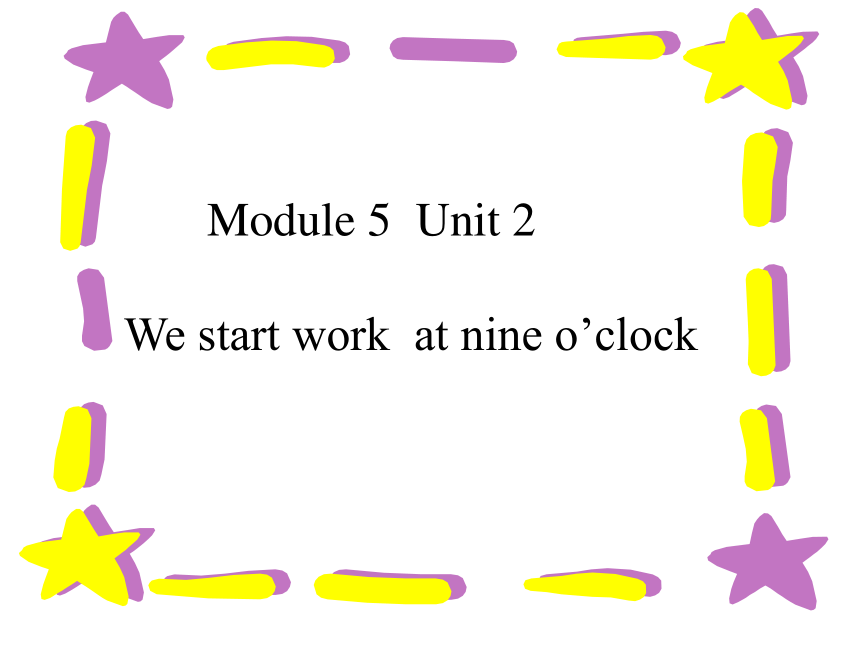
|
|
| 格式 | zip | ||
| 文件大小 | 2.7MB | ||
| 资源类型 | 教案 | ||
| 版本资源 | 外研版 | ||
| 科目 | 英语 | ||
| 更新时间 | 2013-03-12 00:00:00 | ||
图片预览

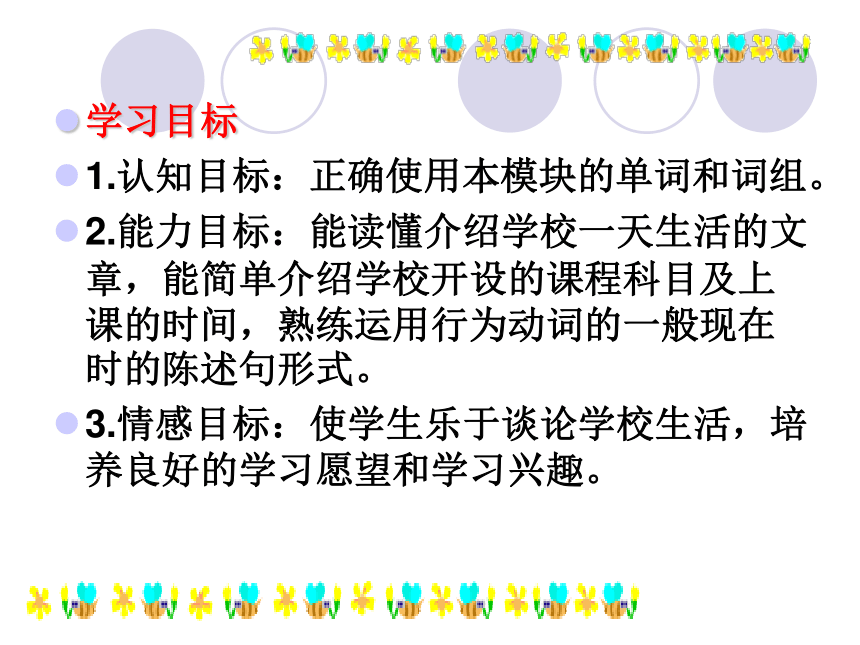
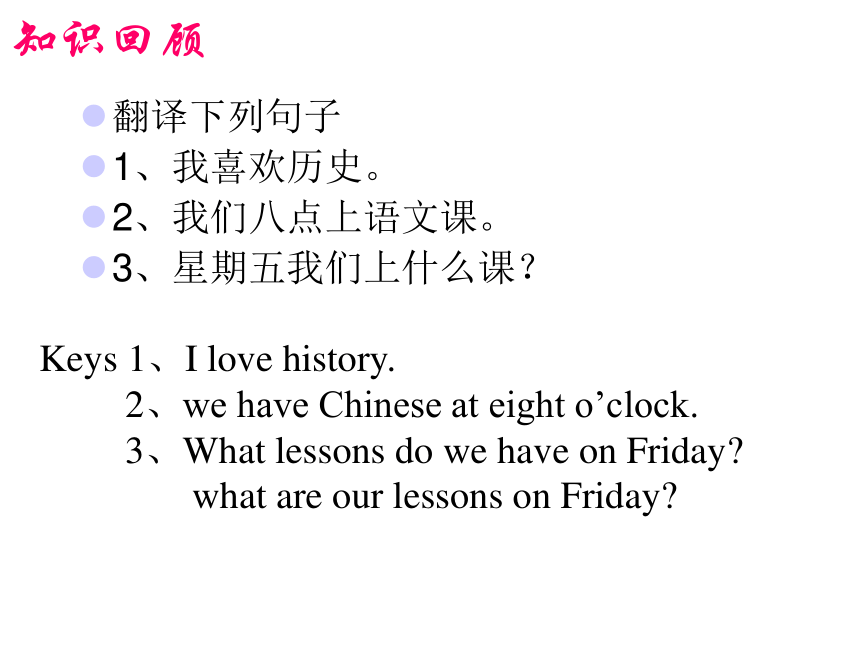
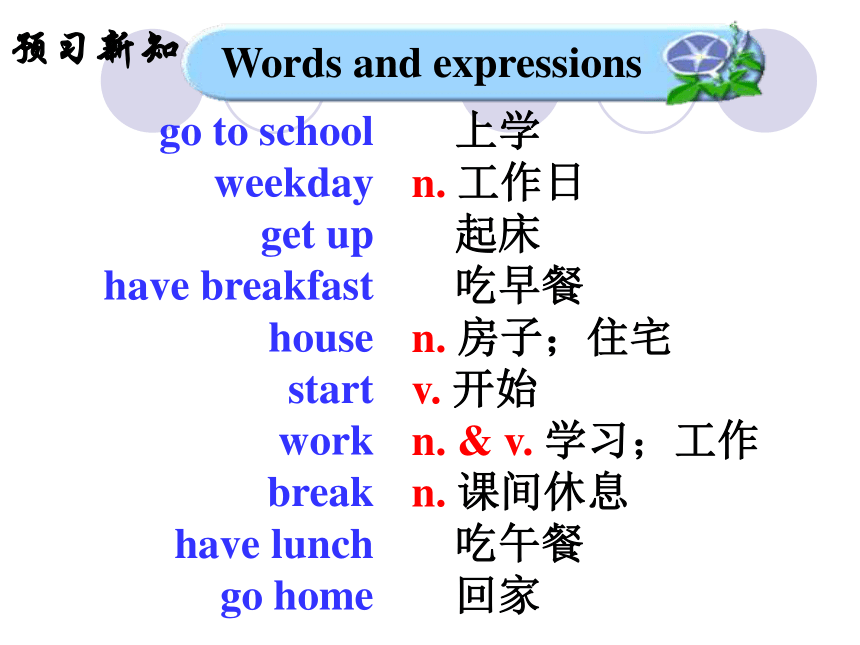

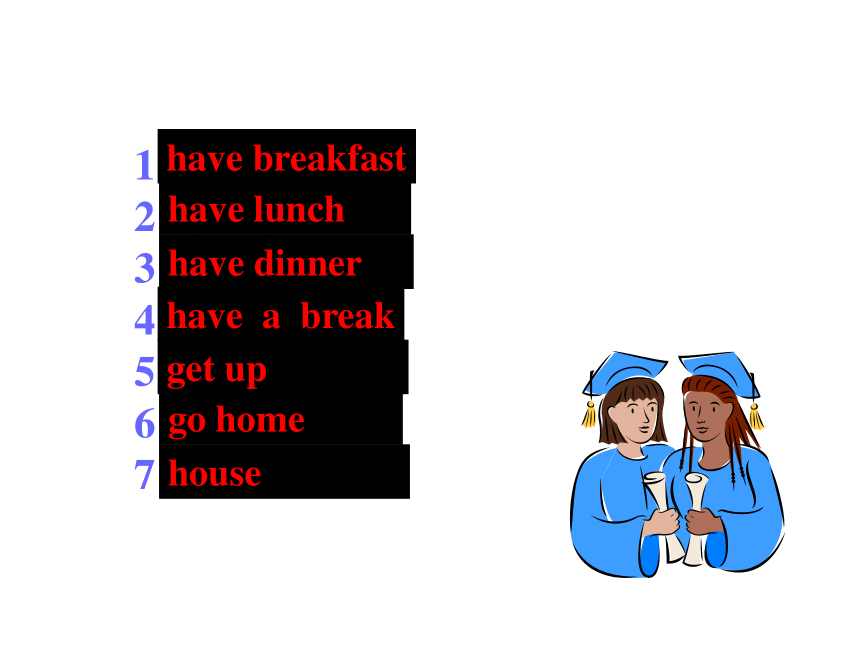
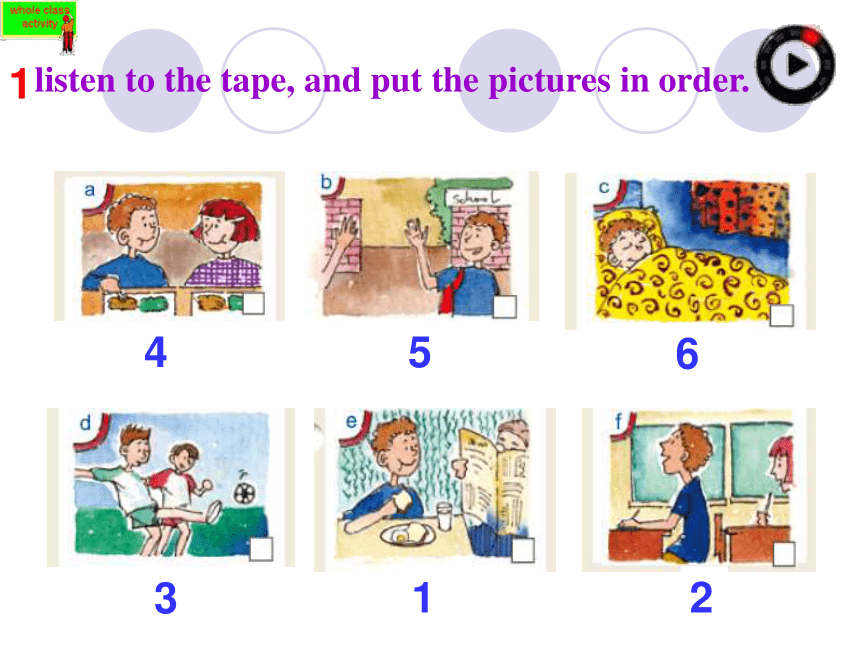
文档简介
课件18张PPT。 Module 5 Unit 2
We start work at nine o’clock 学习目标
1.认知目标:正确使用本模块的单词和词组。
2.能力目标:能读懂介绍学校一天生活的文 章,能简单介绍学校开设的课程科目及上课的时间,熟练运用行为动词的一般现在时的陈述句形式。
3.情感目标:使学生乐于谈论学校生活,培 养良好的学习愿望和学习兴趣。
知识回顾翻译下列句子
1、我喜欢历史。
2、我们八点上语文课。
3、星期五我们上什么课?
Keys 1、I love history.
2、we have Chinese at eight o’clock.
3、What lessons do we have on Friday?
what are our lessons on Friday?
go to school
weekday
get up
have breakfast
house
start
work
break
have lunch
go home 上学
n. 工作日
起床
吃早餐
n. 房子;住宅
v. 开始
n. & v. 学习;工作
n. 课间休息
吃午餐
回家Words and expressions预习新知evening
watch
have dinner
do
homework
bed
go to bed
sleep
go to sleepn. 晚上
v. 看,观看
吃饭;吃晚餐
v. 做;干
n. 家庭作业
n. 床
上床睡觉
n. 睡觉
v. 睡觉
开始睡觉;入睡Words and expressions1 吃早饭
2 吃午饭
3 吃晚饭
4 休息
5 起床
6 回家
7 房子
have breakfasthave lunch have dinnerhave a breakget upgo homehouse listen to the tape, and put the pictures in order. 45312617:30eMatch the times with the pictures in Activity 1.210:0012:303:3011:009:00cdabf3、读文章,划出正确的短语。
1. I get up/start work at 7:30.
2 .We have a break/have lunch at 12:30.
3. I go home/watch TV in the evening.
4. I do my homework /see my friends
in the evening.
5. I go home/ go to sleep at 10.4、Read the passage carefully and loudly and
find the answers:
1 Where is Alex’s school?
2 Does he like football?
3 What do they have for lunch?
4 What does he do in the evening?Near his home.No,he doesn’t.Meat and rice with vegetables or humburgers.Watches TV ,has dinner ,does his homework and goes to bed. 精讲点拨1、go to school 意思是 “去上学”,泛指这一动作,不是指去哪一所学校。School 前不加冠词。类似的还有go to bed.
We on Monday.我们周一上学。
2. I get up at half past seven in the morning and have breakfast.
我早上7点半起床,然后吃早餐。
(1)表示“吃早/午/晚饭”一般用have ,有时也用eat.表示一日三餐的名称前不加冠词,若要表示“一日三餐吃什么” 。要用have、、、for breakfast/lunch/supper.
如:We have bread and milk for breakfast
(2)have是英语中常见的一个动词,和不同的 词搭配有不同的意思。
have lessons 上课 have dinner 吃饭
have a rest 休息 have a look 看一看
have a good time 玩得愉快
.Look at these sentences. I get up at seven o’clock. I go to school
at eight o’clock.
I get up at seven o’clock and then go to school at eight o’clock.5Now join these sentences with and then.1. In the morning, we get up. We go to
school.
2. In the afternoon, we have lessons. We play football in the playground.
3. In the evening, I have dinner. I do my homework.
4. In the evening, I do my homework. I go to bed.In the morning, we get up and then go to school.In the afternoon, we have lessons and then play football in the playground.In the evening, I have dinner and then do my homework.In the evening, I do my homework and then go to bed.Work in pairs. Talk about your school day.
I get up at half past seven.
We start work at nine o’clock.
We have lunch at half past twelve.
A: What time do you get up everyday?
B: I get up at half past seven.
A: What time do you start work?
B: We start work at nine o’clock.
反思归纳 课堂展示达标测试,课后提升 一、根据汉语写单词。1. The matches ______ (结束) at half past
nine.
2. We _____ (不) live in New York.
3. Sam likes _____ (做) housework.
4. The book show _____ (开始) at nine.
5. After having two lessons, we have a
______ (休息).finishdon’tdoingstartsbreak二、用所给的单词的适当形式填空。1. They ____ (go) to bed at nine o’clock.
2. You ________ (not go) home.
3. I _______ (watch) TV in the evening.
4. He gets up and ___ (have) breakfast.
5. _______ (lesson) start at half past one in the afternoon.
6. We do our __________ (homework) in
the evening.godon’t gowatchhasLessonshomework课后提升
1. 复习巩固本课语言点,小组检查反馈。
2. 分层作业:完成行知天下unit2 。(必做)
二、 以 my school day 为题,写一篇短文,介绍一下你在学校的一天。 (选做)
【预习性作业】
预习作业:预习本模块Unit3。Thank you!
We start work at nine o’clock 学习目标
1.认知目标:正确使用本模块的单词和词组。
2.能力目标:能读懂介绍学校一天生活的文 章,能简单介绍学校开设的课程科目及上课的时间,熟练运用行为动词的一般现在时的陈述句形式。
3.情感目标:使学生乐于谈论学校生活,培 养良好的学习愿望和学习兴趣。
知识回顾翻译下列句子
1、我喜欢历史。
2、我们八点上语文课。
3、星期五我们上什么课?
Keys 1、I love history.
2、we have Chinese at eight o’clock.
3、What lessons do we have on Friday?
what are our lessons on Friday?
go to school
weekday
get up
have breakfast
house
start
work
break
have lunch
go home 上学
n. 工作日
起床
吃早餐
n. 房子;住宅
v. 开始
n. & v. 学习;工作
n. 课间休息
吃午餐
回家Words and expressions预习新知evening
watch
have dinner
do
homework
bed
go to bed
sleep
go to sleepn. 晚上
v. 看,观看
吃饭;吃晚餐
v. 做;干
n. 家庭作业
n. 床
上床睡觉
n. 睡觉
v. 睡觉
开始睡觉;入睡Words and expressions1 吃早饭
2 吃午饭
3 吃晚饭
4 休息
5 起床
6 回家
7 房子
have breakfasthave lunch have dinnerhave a breakget upgo homehouse listen to the tape, and put the pictures in order. 45312617:30eMatch the times with the pictures in Activity 1.210:0012:303:3011:009:00cdabf3、读文章,划出正确的短语。
1. I get up/start work at 7:30.
2 .We have a break/have lunch at 12:30.
3. I go home/watch TV in the evening.
4. I do my homework /see my friends
in the evening.
5. I go home/ go to sleep at 10.4、Read the passage carefully and loudly and
find the answers:
1 Where is Alex’s school?
2 Does he like football?
3 What do they have for lunch?
4 What does he do in the evening?Near his home.No,he doesn’t.Meat and rice with vegetables or humburgers.Watches TV ,has dinner ,does his homework and goes to bed. 精讲点拨1、go to school 意思是 “去上学”,泛指这一动作,不是指去哪一所学校。School 前不加冠词。类似的还有go to bed.
We on Monday.我们周一上学。
2. I get up at half past seven in the morning and have breakfast.
我早上7点半起床,然后吃早餐。
(1)表示“吃早/午/晚饭”一般用have ,有时也用eat.表示一日三餐的名称前不加冠词,若要表示“一日三餐吃什么” 。要用have、、、for breakfast/lunch/supper.
如:We have bread and milk for breakfast
(2)have是英语中常见的一个动词,和不同的 词搭配有不同的意思。
have lessons 上课 have dinner 吃饭
have a rest 休息 have a look 看一看
have a good time 玩得愉快
.Look at these sentences. I get up at seven o’clock. I go to school
at eight o’clock.
I get up at seven o’clock and then go to school at eight o’clock.5Now join these sentences with and then.1. In the morning, we get up. We go to
school.
2. In the afternoon, we have lessons. We play football in the playground.
3. In the evening, I have dinner. I do my homework.
4. In the evening, I do my homework. I go to bed.In the morning, we get up and then go to school.In the afternoon, we have lessons and then play football in the playground.In the evening, I have dinner and then do my homework.In the evening, I do my homework and then go to bed.Work in pairs. Talk about your school day.
I get up at half past seven.
We start work at nine o’clock.
We have lunch at half past twelve.
A: What time do you get up everyday?
B: I get up at half past seven.
A: What time do you start work?
B: We start work at nine o’clock.
反思归纳 课堂展示达标测试,课后提升 一、根据汉语写单词。1. The matches ______ (结束) at half past
nine.
2. We _____ (不) live in New York.
3. Sam likes _____ (做) housework.
4. The book show _____ (开始) at nine.
5. After having two lessons, we have a
______ (休息).finishdon’tdoingstartsbreak二、用所给的单词的适当形式填空。1. They ____ (go) to bed at nine o’clock.
2. You ________ (not go) home.
3. I _______ (watch) TV in the evening.
4. He gets up and ___ (have) breakfast.
5. _______ (lesson) start at half past one in the afternoon.
6. We do our __________ (homework) in
the evening.godon’t gowatchhasLessonshomework课后提升
1. 复习巩固本课语言点,小组检查反馈。
2. 分层作业:完成行知天下unit2 。(必做)
二、 以 my school day 为题,写一篇短文,介绍一下你在学校的一天。 (选做)
【预习性作业】
预习作业:预习本模块Unit3。Thank you!
同课章节目录
- Starte
- Module 1 My teacher and my friends
- Module 2 My English lesson
- Module 3 My English book
- Module 4 My everyday life
- Module 1 My classmates
- Unit 1 Nice to meet you.
- Unit 2 I'm Wang Lingling and I'm thirteen years ol
- Unit 3 Language in use.
- Module 2 My family
- Unit 1 Is this your mum?
- Unit 2 These are my parents.
- Unit 3 Language in use.
- Module 3 My school
- Unit 1 There are thirty students in my class.
- Unit 2 The library is on the left of the playgroun
- Unit 3 Language in use.
- Module 4 Healthy food
- Unit 1 We've got lots of apples.
- Unit 2 Is your food and drink healthy?
- Unit 3 Language in use.
- Module 5 My school day
- Unit 1 I love history.
- Unit 2 We start work at nine o'clock.
- Unit 3 Language in use.
- Revision module A
- Module 6 A trip to the zoo
- Unit 1 Does it eat meat?
- Unit 2 The tiger lives in Asia.
- Unit 3 Language in use.
- Module 7 Computers
- Unit 1 How do I write my homework on the computer?
- Unit 2 When do you use a computer?
- Unit 3 Language in use.
- Module 8 Choosing presents
- Unit 1 I always like birthday parties.
- Unit 2 She often goes to concerts.
- Unit 3 Language in use.
- Module 9 People and places
- Unit 1 We're enjoying the school trip a lot.
- Unit 2 They're waiting for buses or trains.
- Unit 3 Language in use.
- Module 10 Spring Festival
- Unit 1 Are you getting ready for Spring Festival?
- Unit 2 My mother's cleaning our houses and sweepin
- Unit 3 Language in use.
- Revision module B
